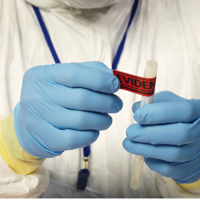
NEW YORK – Trust in the scientific community declined among American adults in 2022, a major survey shows, driven by a partisan divide in views of both science and medicine that emerged during the COVID-19 pandemic. 19.
A technician prepares samples from patients with the COVID-19 coronavirus for testing in a laboratory on March 11, 2020 in Long Island, New York.
Overall, 39 percent of American adults said they had “a lot of trust” in the scientific community, down from 48 percent in 2018 and 2021. That’s according to the General Social Survey, a long-running survey conducted by NORC at the University. of Chicago that has controlled Americans’ opinions on key issues since 1972.
An additional 48 percent of adults in the latest poll reported “only a little” confidence, while 13 percent reported “almost none,” according to an analysis of the poll by The Associated Press-NORC Center for Public Affairs Research.
The poll showed low levels of trust among Republicans as the partisan gaps that emerged during the pandemic era remain, said Jennifer Benz, the center’s deputy director.
“It doesn’t seem that dramatic when you’re just looking at the trends for the general public,” Benz said. “But when you drill down into that by people’s political affiliations, there’s a very serious drop-off and polarization.”
Between the 2018 and 2021 polls, as the pandemic took hold, the major parties’ confidence levels went in opposite directions. Democrats reported a growing level of confidence in science in 2021, perhaps as a “concentration effect” around things like COVID-19 vaccines and prevention measures, Benz said. At the same time, Republicans saw their confidence begin to plummet.
In the 2022 poll, confidence among Democrats fell back to pre-pandemic levels, with 53% reporting a great deal of confidence compared to 55% in 2018. But confidence among Republicans continued to downward trend, falling to 22% from 45% in 2022. 2018. Trust in medicine has also become more polarized since 2018. That year, Democrats and Republicans were equally likely to say they had a high confidence By 2022, however, Republicans’ trust had fallen to 26%, while Democrats’ trust has remained roughly the same as before the pandemic at 42%.
Overall, 34% of Americans reported high trust in medicine in 2022, compared to 39% before the pandemic.
Scientists have generally had a high level of trust compared to other groups in the United States, said John Besley, who studies public opinion about science at Michigan State University. And even with recent declines, trust in science is still higher than in many other institutions, he noted.
But the division between political parties is a cause for concern, experts said.
“You can definitely see the impact here of people taking cues from their political leaders,” Benz said.
For Sudip Parikh, CEO of the American Association for the Advancement of Science, the declines were “disappointing but not surprising.” He sees them as part of a “general disconnection from our communities” and a loss of trust in many institutions.
The latest survey found that mistrust has also grown for some other groups. According to the 2022 survey, trust in the Supreme Court has fallen to its lowest level in at least 50 years. Americans also reported lower levels of trust in education, the press, big business and organized religion.
Besley said scientists should communicate about their motives to help prove they’re trustworthy: “Not only do we have some experience, but we’re also using that experience to try to make the world better,” he said. to say.
Parikh felt that there is a lot at stake to restore trust in science, and to do it across political lines.
“Science has to be bipartisan,” he said. “The causes of Alzheimer’s are the same whether you are a Republican or a Democrat. The melting that takes place in the sun is the same whether you live in Topeka or San Francisco.
The General Social Survey has been carried out since 1972 by NORC at the University of Chicago. Sample sizes for each year’s survey vary from about 1,500 to about 4,000 adults, with margins of error between plus or minus 2 percentage points and plus or minus 3.1 percentage points. The most recent survey was conducted from May 5, 2022, to December 20, 2022, and includes interviews with 3,544 American adults. Results for the full sample have a margin of error of plus or minus 3 percentage points.
What others are reading…
[ad_2]
Source link





